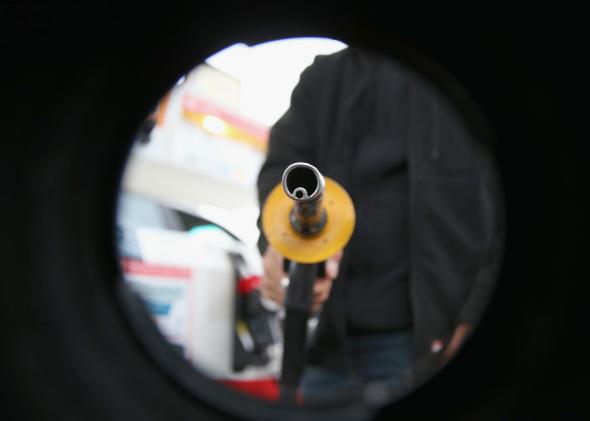Back during the 2012 election, when Republicans like Newt Gingrich were busy assailing President Barack Obama over high gas prices and promising to open up America’s coasts to offshore oil rigs galore, the liberal response was mostly dismissive. It was impossible, many argued, for the United States to drill its way to lower gas prices.
“[P]roduction in the United States really does not matter much for the price of gas,” wrote Dean Baker of the Center for Economic and Policy Research, who said that the U.S. could increase its output by a third without meaningfully reducing fuel prices. “Oil prices in the United States depend on the world market, not just supply and demand in the United States.”
“If increasing oil drilling lowered gas prices, we’d know it already,” explained Michael Conathan, director of ocean policy at the Center for American Progress. The U.S. had already massively increased oil production, he pointed out, but it hadn’t brought down the cost of fuel. How come? Among other things, other countries had decreased their output to keep prices up.
It wasn’t even just liberals. When ThinkProgress compiled a list of “20 Experts Who Say Drilling Won’t Lower Gas Prices,” it included names like former John McCain adviser Douglas Holtz-Eakin and Fox News’ John Stossel.
These were not absurd or especially ideological arguments. There had never been much of a statistical relationship between U.S. oil production and what Americans paid at the pump. But with crude prices crashing, gas down to about $3 a gallon, and the International Energy Agency declaring that we have reached “a new chapter in the history of the oil markets,” it is time to acknowledge that the left in some respects was wrong and that drilling in North Dakota, Texas, and beyond has actually helped cut the price of gas.
Drilling didn’t do the trick alone, mind you. There are essentially three reasons that crude prices have fallen by about 30 percent since June: Supply, demand, and Saudi Arabia. Thanks largely to surging U.S. production, the amount of oil on the market is up. But thanks to China’s slowdown, Europe’s chronic economic troubles, and American conservation, demand hasn’t kept pace. The upshot: The world enjoyed 2.2 million barrels a day of surplus crude during September and October, more than all of the oil pumped out of the earth in Qatar or in Norway. (Worth noting: U.S. production alone is up 2.4 million barrels per day over the past three years.)
The combination of U.S. drilling and a global slowdown didn’t necessarily have to end in plummeting oil prices. Traditionally, OPEC members have cut their production in the face of global gluts in order to keep their profits high. But now, OPEC appears to be fraying. Earlier this month, Saudi Arabia shocked much of the world by cutting its crude export prices to the U.S., in what was interpreted as an attempt to protect its market share and possibly put pressure on America’s domestic drillers. Instead of trying to buoy the price of petroleum, the Saudis are now helping drive it down further in order to save their own revenue stream.
The kingdom’s move was unexpected. But at least some analysts foresaw the possibility that something like it might happen. “Big-enough gains in global oil production could spark a battle among OPEC members and other big producers for market share, leading to a crash in world prices,” Council on Foreign Relations fellow Michael Levi wrote in his 2013 book The Power Surge. The International Monetary Fund, he noted, had already estimated that a 5 percent increase in global supply of oil (about equivalent to 5 million barrels a day at the time) could drop prices by as much as 50 percent, since small shortages or gluts can have extremely large impact on the market. In other words, the idea that additional drilling could bring down the cost of crude, and with it the price of gasoline, should never have been considered absurd.
This isn’t to say that pumping more crude is a permanent solution to high energy prices. We’ve now entered that new world of oil abundance, and as the IEA argued in a report last week, there are no signs that that the world will be short on hydrocarbons any time soon. But as China and India continue to grow and Europe (hopefully) shakes out of its economic daze, supplies could eventually get tight again.
It’s also not to say that the GOP was right about oil in 2012. In fact, the past few years seem to have proven them dead wrong. Republican politicians have desperately wanted to open up more of America’s shoreline for drilling, as well as parts of Alaska that are off-limits. Aside from the fact that none of those offshore sites would have yielded oil for years, none of that was necessary to bring down prices, which, if they were to fall much further, might endanger U.S. production by making expensive shale plays unprofitable.
In short, the left might have flubbed the oil issue back in 2012. But so did the right.
